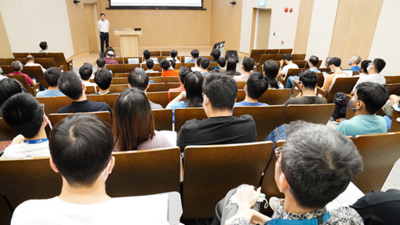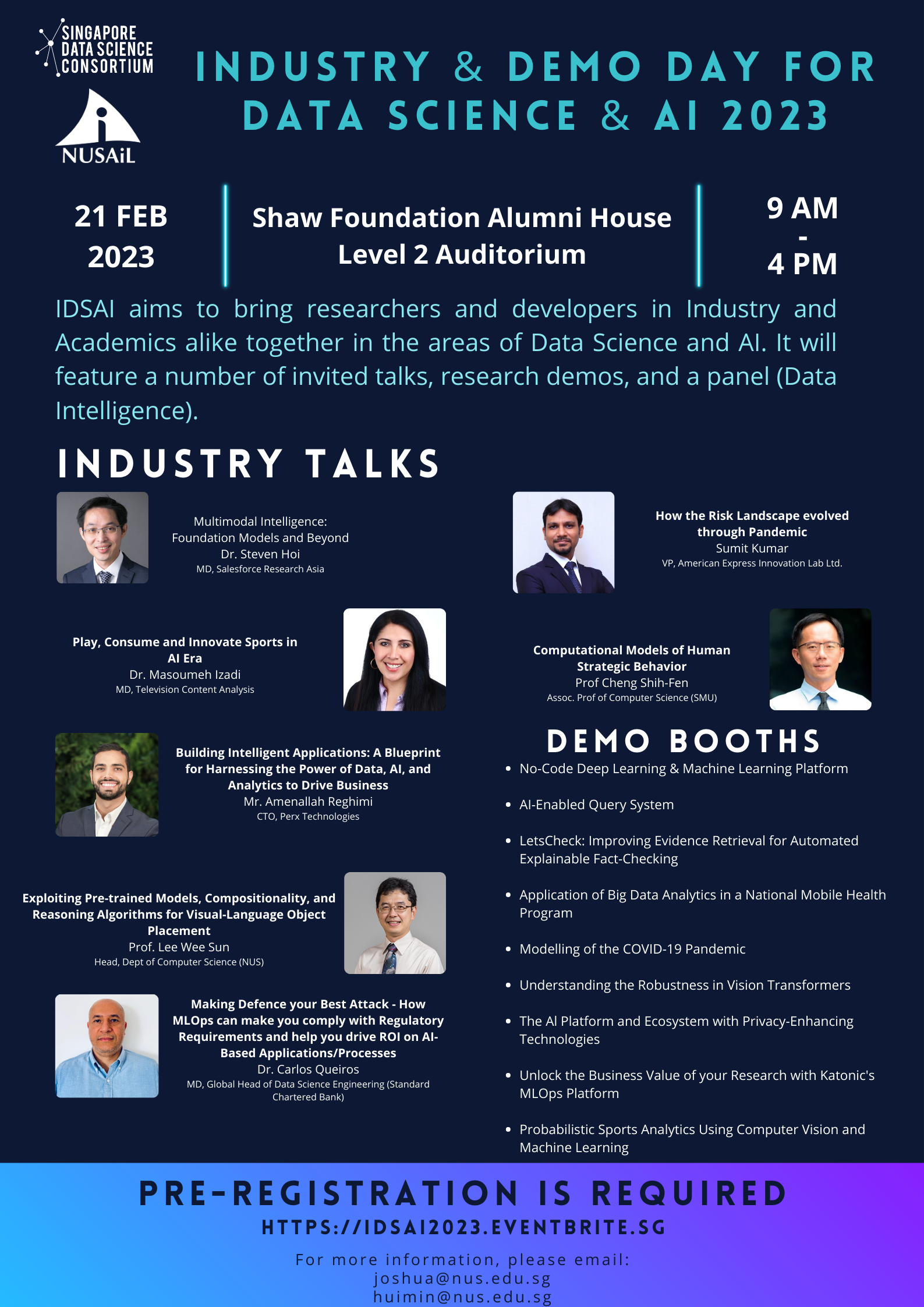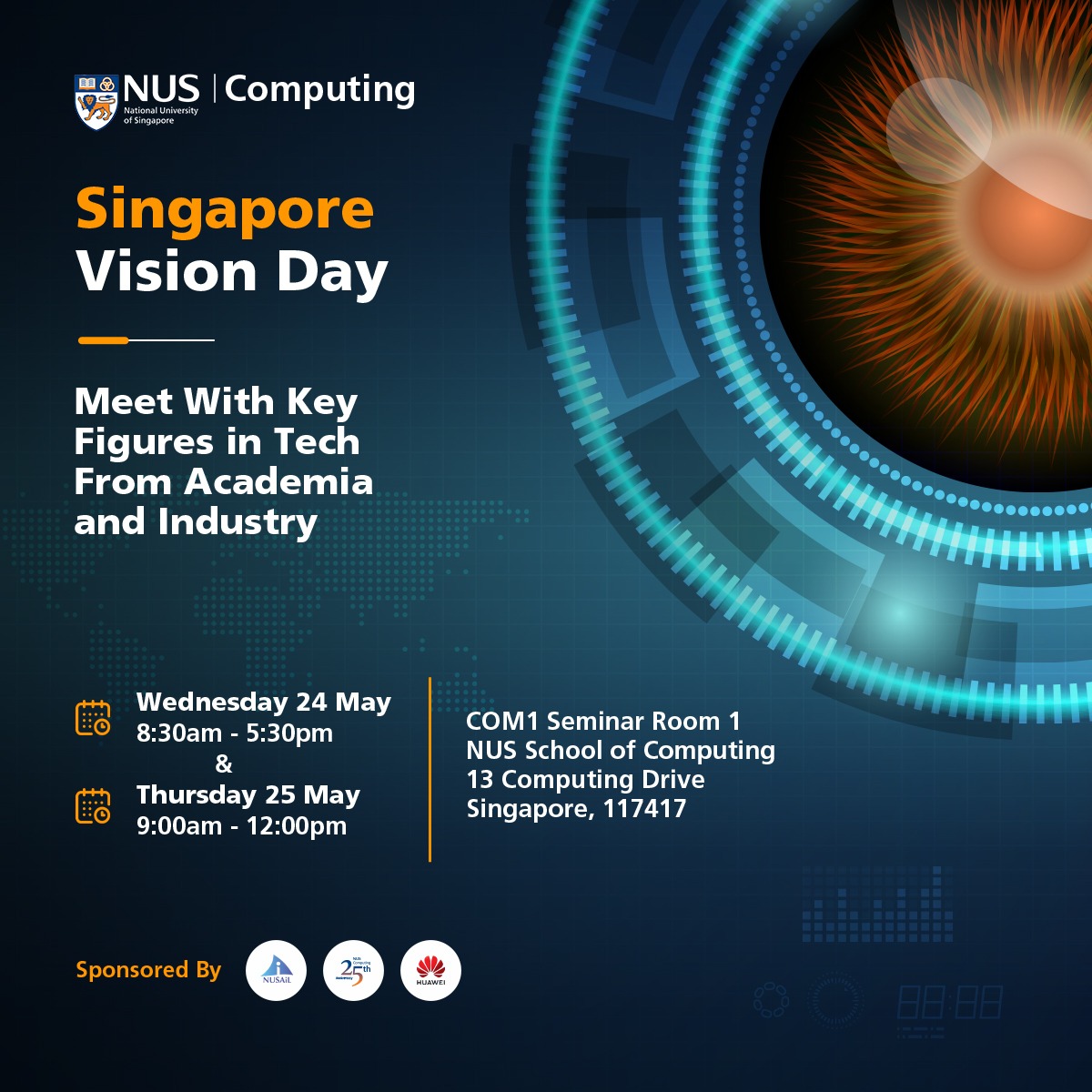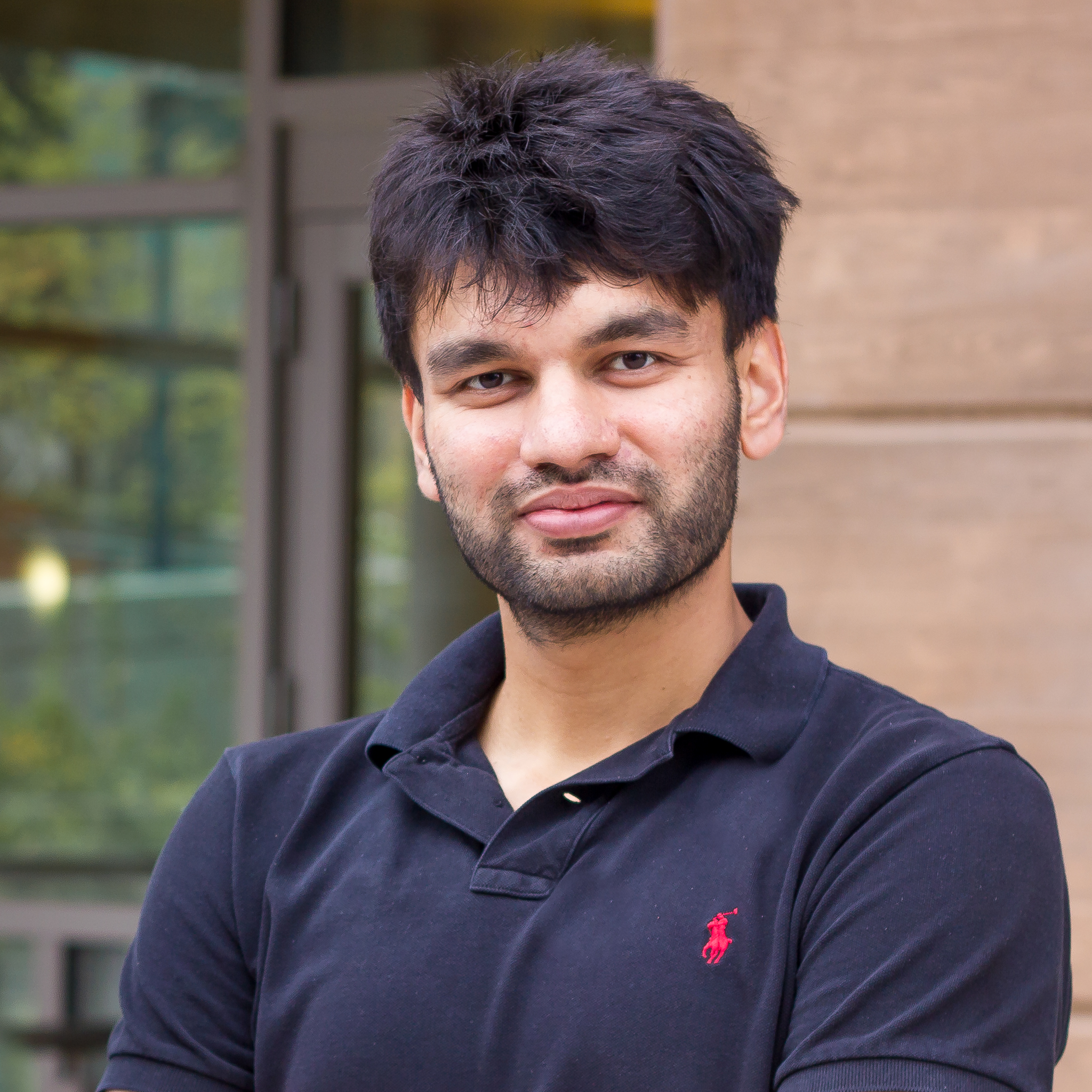Summer School
Kent Ridge Campus, Singapore (innovation 4.0 & School of Computing, National University of Singapore)Title Summer School Date & Time 22-26 Jluy 2019 Venue Kent Ridge Campus, Singapore (innovation 4.0 & School of Computing, National University of Singapore) The first AI Summer School will bring together…
NUS Computing: Future of Artificial Intelligence Symposium
NUS Computing COM1 #02-06 Seminar Room 1 (SR 1) COM1 13 Computing Drive Singapore 117417, SingaporeVisual intelligence is a cornerstone of intelligence, for both humans and machines. In this talk, I go over a number of research work by our group on the topics of visual perception and robotic learning. The guiding principle of our work is inspired by the Gibsonian belief that perceptual and robotic learning should be based on an ecology approach, solving tasks and problems approximating the real-world setting and scale.
From Seeing to Doing: Understanding and Interacting With the Real World
NUS Computing COM1 #02-06 Seminar Room 1 (SR 1) COM1 13 Computing Drive Singapore 117417, SingaporeVisual intelligence is a cornerstone of intelligence, for both humans and machines. In this talk, I go over a number of research work by our group on the topics of visual perception and robotic learning. The guiding principle of our work is inspired by the Gibsonian belief that perceptual and robotic learning should be based on an ecology approach, solving tasks and problems approximating the real-world setting and scale.

Machine Learning at All Levels – a pathway to “Autonomous” AI
Innovation 4.0, I4-01-03 - SEMINAR ROOM, 3 Research Link, Singapore 117602 COM1 13 Computing Drive Singapore 117417, SingaporeVisual intelligence is a cornerstone of intelligence, for both humans and machines. In this talk, I go over a number of research work by our group on the topics of visual perception and robotic learning. The guiding principle of our work is inspired by the Gibsonian belief that perceptual and robotic learning should be based on an ecology approach, solving tasks and problems approximating the real-world setting and scale.

Towards the Industrial Metaverse
Innovation 3 Auditorium 21 Heng Mui Keng Terrace, Icube Building, Singapore 119613, SingaporeWhile true AR/MR consumers devices are probably still years away, devices like HoloLens2 already have compelling applications in industry today. In this talk we will review what devices can do today and then present ongoing research expanding those capabilities. We will discuss how egocentric activity recognition can be used to enable devices to better assist users in learning and performing tasks.

SoC-FoS Joint workshop – AI Research Grant Call 2022
COM2-04-02 Executive Classroom and COM2-04-01 Multipurpose SpaceWorkshop objectives:
• Aim to start conversations, deepen interactions and foster closer collaborations between the School of Computing (SoC) and Faculty of Science (FoS).
• Encourage collaborative projects involving SoC and FoS researchers targeting the AI research grant call to seed high-quality research efforts aimed at developing AI and adjacent technologies.

Industry & Demo Day For Data Science & AI 2023
Shaw Foundation Alumni House Level 2 AuditoriumIndustry & Demo Day For Data Science & AI 2023 /*! elementor - v3.13.2 - 11-05-2023 */ .elementor-widget-image{text-align:center}.elementor-widget-image a{display:inline-block}.elementor-widget-image a img{width:48px}.elementor-widget-image img{vertical-align:middle;display:inline-block}

Singapore Vision Day 2023
COM1 Seminar Room 1 (COM1 02-06)/*! elementor - v3.13.3 - 28-05-2023 */.elementor-widget-image{text-align:center}.elementor-widget-image a{display:inline-block}.elementor-widget-image a img{width:48px}.elementor-widget-image img{vertical-align:middle;display:inline-block} 30 May 2023 — Held in conjunction with NUS Computing’s 25th Anniversary, the inaugural Singapore Vision Day 2023 welcomed…

Building Connections: From Human-Human to Human-AI Collaboration symposium
Singapore EXPO , SingaporeProgram Schedule (As of July 11) AAAI 2023 Summer Symposium Series Building Connections: From Human-Human to Human-AI Collaboration Venue: Garnet 213, Level 2 Singapore EXPO Note: Full papers (17 mins…

NUSAiL Distinguished AI Lecture Series – Prof Marta Kwiatkowska
NUS Computing COM1 #02-06 Seminar Room 1 (SR 1) COM1 13 Computing Drive Singapore 117417, SingaporeComputing systems are becoming ever more complex, with automated decisions increasingly often based on deep learning components. A wide variety of applications are being developed, many of them safety-critical, such as self-driving cars and medical diagnosis. Since deep learning is unstable with respect to adversarial perturbations, there is a need for rigorous software development methodologies that encompass machine learning components. This lecture will describe progress with developing automated certification techniques for learnt software components to ensure safety and adversarial robustness of their decisions, including the role of causality, uncertainty and neuro-symbolic approaches.

AI Horizons: Interactive Learning and Control in the Era of Large Models By Dorsa Sadigh
COM3, School of Computing , SingaporeThe talk delved into interactive learning, emphasizing learning objective functions from human feedback to capture preferences. It highlighted using large language models for value alignment and reward design in AI, extending beyond preference-based learning. The speaker discussed the importance of large pre-trained models in robotics, focusing on two aspects: pre-training for robotics tasks and using these models for more aligned AI agents. Key topics included "Voltron," a language-informed approach for robotics, and leveraging Large Language and Vision Models to understand human preferences and assist in teaching. The talk concluded with insights on how large models can identify and transform patterns, aiding in solving control problems.

AI Horizons: Towards physical intelligence by Pulkit Agrawal
COM3, School of Computing , SingaporeThe talk revolved around an advanced framework for developing robots with capabilities akin to human physical intelligence. This innovative approach was focused on enabling robots to master complex sensorimotor tasks with reduced human intervention. Key highlights included case studies of a highly skilled manipulation system, an agile quadruped robot, and a robot capable of lifelong learning for manipulating objects. Additionally, the talk delved into algorithmic enhancements aimed at simplifying the training process for these robots, integrating inputs from direct demonstrations and autonomous exploration.